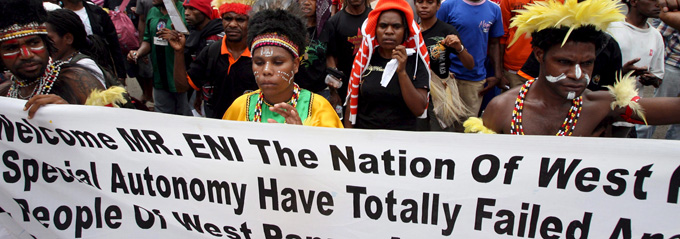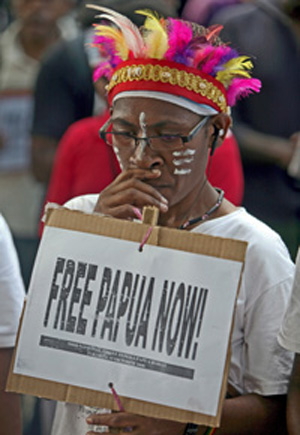Lush plans banned Morning Star flag shop protest for Papuans

Paula Makabory and other West Papuans and supporters protest in Auckland during the Pacific Islands Forum last year. Image: Alex Perrottet / PMC
A cosmetics chain store is joining an awareness campaign next week over the indigenous West Papuan independence struggle.
Pacific Scoop:
Report – By Suze Metherell
Report – By Suze Metherell
The “banned” Morning Star flag of West Papuan independence will be displayed in shop fronts across New Zealand next week.
The flag, which is illegal in both Indonesian-ruled Melanesian provinces in the region of West Papua, will be displayed in Lush natural cosmetics stores as part of a campaign to raise awareness about the indigenous independence struggle.
The campaign will run in conjunction with New Zealand-based West Papuan advocacy group, the Indonesia Human Rights Committee.
On Wednesday, employees will hold a protest outside their stores, with tape over their mouths to symbolise the lost voice of West Papuans.
Currently international journalists are forbidden from entering West Papua and the Indonesian media has been accused of misrepresenting the self- determination movement.
Margaret Taylor, activism support manager at Amnesty International, says there are grave concerns about human rights in the two West Papua provinces.
Media not free
“The media is not free there. A free media is one of the best ways to guarantee that human rights will be respected – and in the region some of the media has been targeted,” Taylor says.
“The media is not free there. A free media is one of the best ways to guarantee that human rights will be respected – and in the region some of the media has been targeted,” Taylor says.
Maire Leadbeater, spokesperson for the Indonesia Human Rights Committee, says the restrictions on the media limit greater global awareness of the issue.
“It’s partly deliberate policy on the part of Indonesians to restrict access to West Papua,” Leadbeater says.
“It is a tragedy really, that a country, which is a Melanesian nation in every other way, geographically, culturally, and ethnically and should be part of our Pacific, has been kept separate in that way.
“The Pacific neighbours find it hard to understand what is happening there because we only see so little information about it,” she says.
West Papua is internationally recognised as part of Indonesia, despite over 40 years of separatist movements by indigenous West Papuans.
Green Party MP Catherine Delahunty will also attend next week’s protest.
Delahunty believes the situation is becoming increasingly desperate for West Papuans.
Shot dead
On June 14, pro-independence leader Mako Tabuni was shot dead by Indonesian police.
On June 14, pro-independence leader Mako Tabuni was shot dead by Indonesian police.
Tabuni had been campaigning for an investigation into the death of West Papuans at the hands of the Indonesian military.
“I think that the situation on the ground is getting worse, because really it’s hard to keep hope alive that the government of Indonesia will recognise what is going on in terms of the self-determination of West Papua.
“I think there is a strong peace movement, and a strong leadership from the churches and many activists for a peaceful dialogue. But there are acts of violence but there is also a lot of provocation, deliberate provocation, by the Indonesians and military behaviour that is out of control,” Delahunty says.
“It is very, very hard without an independent media, or even the Red Cross being allowed to be there to find out whether the situation is; whether there are more acts of violent resistance by West Papuans, or whether a lot of it is being provoked.”
Leadbeater says since the 1960s Indonesia has increased its military presence in the area in a bid to keep control of the resource rich Freeport gold mine based in the province.
“For all of that time there has been a strong resistance to Indonesian rule sometimes led by a guerrilla movement, but a poorly armed guerrilla movement.
Rights abuses
“In many ways it is quite a close parallel to the East Timor situation. Because again you have a population that doesn’t accept being ruled by Indonesia, you have very heavy militarisation and ongoing human rights abuses and massacres under Indonesian rule; it’s a parallel in that situation,” says Leadbeater.
“In many ways it is quite a close parallel to the East Timor situation. Because again you have a population that doesn’t accept being ruled by Indonesia, you have very heavy militarisation and ongoing human rights abuses and massacres under Indonesian rule; it’s a parallel in that situation,” says Leadbeater.
Not only are there reports of human rights abuses by the Indonesian police and military in the area, but environmental degradation due to deforestation and illegal logging.
Indonesia has also maintained an official policy of trans-migration to the province.
“The Indonesian migrants are now believed to be at a larger number in the total population than the indigenous Papuans,” says Leadbeater.
“It does make it very difficult for self-determination once that starts to happen. [The Indonesian Government] arranged for the people to be encouraged to move from over from crowded islands to West Papua and set up little villages.
Pressure needed
“Never mind the fact that indigenous people were already on the land.”
“Never mind the fact that indigenous people were already on the land.”
Delahunty says New Zealand awareness surrounding Indonesia’s involvement in West Papua needs to increase, so that the public can pressure the New Zealand government into action.
“We will not be giving up in raising awareness of the issue… I think we are far more likely to get greater awareness amongst New Zealand citizens who don’t believe in unfairness and violence by the state.
“I think the government is a follower, definitely not a leader on this issue, sadly,” says Delahunty.
Both Delahunty and Leadbeater agree that the government could take a tougher human rights approach to Indonesia.
“There are things that New Zealand can do, that it’s not doing. To some extent the fact that we have an ongoing military relationship with Indonesia undermines our human rights stand,” says Leadbeater.
Delahunty says there is an opportunity for New Zealand to play a leadership role in the struggle, by offering to mediate between the two interests.
“New Zealand could play a really good role and offer to negotiate a peace dialogue,” says Delahunty.
Influential players
“I think that the West Papuan people would love to see either Australia or New Zealand, who are influential players in the region, with resources and influence to support a change in attitude from the Indonesians by calling for this peace dialogue.
“I think that the West Papuan people would love to see either Australia or New Zealand, who are influential players in the region, with resources and influence to support a change in attitude from the Indonesians by calling for this peace dialogue.
“It may not be accepted by the Indonesians, but at least it would be an indication by the New Zealand government recognising the need for that kind of arbitration and that kind of dialogue.”
Joe Collins, secretary of the Australians for West Papua Association (Sydney), says recognising West Papua as Melanesian is vital to self-determination and independence from Indonesia.
He thought awareness in Australia was increasing, and the Jakarta government was becoming increasingly concerned about the increasing international spotlight on the situation.
“I think, unfortunately, it will get a bit worse before it gets better.”
However, he says dialogue is the best way forward and international pressure will be a powerful tool for the people of the Morning Star.
“I think the more publicity that happens, the more pressure will come on Jakarta and they will need to respond,” he says.
The Lush Free West Papua campaign will run next week, and all proceeds from the sale of the Smell of Freedom perfume will be donated to Indonesia Human Rights Committee.
Suze Metherell is a Postgraduate Diploma in Communication Studies student journalist on the Asia-Pacific Journalism course at AUT University.












